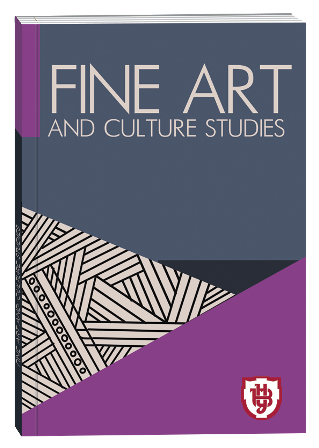LEARNING A MUSICAL COMPOSITION IN THE PIANO CLASSROOM BY MEANS OF INSTRUMENTAL TECHNOLOGIES
DOI:
https://doi.org/10.32782/facs-2023-6-1Keywords:
musical composition, musical text, student of education, piano training, instrumental technologies, performance skillsAbstract
The aim of the article is to explore the methodological, psychological and pedagogical aspects of studying a musical composition in the process of piano training by means of instrumental technologies. To summarize the importance of repetition, variability of musical material and modification of texture, lad-tonal, rhythmic, harmonic and melodic features and technical formulas in the process of learning a piano piece, to substantiate the factors of learning a musical piece using instrumental technologies. The research methodology includes logical, analytical, psychological, pedagogical and integration methods. The marked approach makes it possible to identify the peculiarities of learning a piano composition in the process of applying instrumental technologies. Scientific novelty. First time is explorings the methodological and performing principles of studying a musical composition in the piano classroom, the expansion the main ways of forming a performing idea by means of instrumental technologies within the framework of distance work with the student of education in the form of gadgets and tablets, which visually depict a musical composition, a musical text for future analysis and study in the piano classroom. Conclusions. Systematic pedagogical and methodological performance work on the study of a musical work in the piano classroom with the student of education is intended to promote metro-rhythmic development, lad-tonal thinking, fantasy, imagination, ability to cover the main framework and integrity of the form, mastery of genre-stylistic, stroke, articulation, dynamic, tempo-agogic, phrasing, intonation features, pedaling for the purpose of perspective construction of the performance plan of the composition by means of instrumental technologies. The technological approach to studying piano composition is conditioned by the specifics of carrying out painstaking work by analyzing and breaking down the main elements and segments of the texture into small components. The decisive importance in the process of forming the final result of the performance in the form of a perfect interpretation of the composition and its performance on stage will ensure the successful pedagogical and performance work of the piano teacher and the performing pianist at the proper artistic level.
References
Загальне та спеціалізоване фортепіано у процесі формування музиканта– професіонала: тези наукового семінару, 11 грудня 2013 р. / упор. О. Гнатишин. Львів: ЛНМА ім. М. В. Лисенка, 2013. 52 с.
Кулікова С. Формування музично-виконавської компетентності майбутніх учителів музичного мистецтва. Неперервна педагогічна освіта ХХІ століття: зб. матеріалів ХVІІ Міжнародних педагогічно-мистецьких читань пам’яті проф. О. Рудницької / [наук. ред.: Г. Сотська, М. Вовк]. 2020. Вип. 3(15). С. 211–213.
Курковський Г. Питання фортепіанного виконавства: збірник статей. К.: Музична Україна, 1983.
Москаленко В. Лекції з музичної інтерпретації: навчальний посібник. К.: НМАУ ім. П.І. Чайковського, 2013. 157 с.
Нарожна М. Читання нот з аркуша як складник комплексного розвитку учня-піаніста. Проблеми інструментального виконавства в умовах сучасної мистецької освіти: матеріали Всеукр. наук.-практ. семінару з міжнар. участю, м. Умань, 27–28 квітня 2015 р. Умань, 2015. С. 56–60.
Панченко О. Розвиток навичок читання нот з аркуша. Виконавська інтерпретація та сучасний навчальний процес: матеріали IІІ Всеукр. наук.-практ. конф., м. Луганськ, 18–19 березня 2010 р. Луганськ, 2010. С. 166–168.
Робоча програма навчальної дисципліни «Фортепіано» для здобувачів спеціальності 025 «Музичне мистецтво», освітня програма 025 «Музичне мистецтво. Вокал» / розр. Г. Глазунова. Київ: Таврійський національний університет імені В.І. Вернадського, ННІ «Академія мистецтв імені С. С. Прокоф’єва», Кафедра музичного мистецтва, 2022. 15 с.
Савицький Р. Основні завдання фортепіанної педагогіки. Львів: Укрвидат, 1994.
Самойленко О. Музикознавство та методологія гуманітарного знання. Проблема діалогу: монографія. Одеса: Астропринт, 2002. 244 с.
Сирота О. Розвиток читання нот з листа у класі фортепіано. Збірник наукових праць молодих вчених Кам’янець-Подільського національного університету імені Івана Огієнка. Секція мистецтвознавчих дисциплін. 2018. Вип.9. С. 68–70.
Чеботаренко О. Музичний текст: структура та проблеми інтерпретації. Наукові записи. Серія: Педагогічні науки. 2017. Вип.157. С. 138–141.
Шахрай О. Завдання фортепіанної педагогіки. Україна наукова. 2018. URL: https://int-konf.org/ru/2013/ukrajina-naukova-24-26-12-2013-r/647-shakhraj-o-m-zavdannya-fortepiannoji-pedagogiki (дата звернення: 21.12.2023).







